Durability Modeling of Environmental Barrier Coating (EBC) Using Finite Element Based Progressive Failure Analysis
IF 16.6
1区 材料科学
Q1 MATERIALS SCIENCE, CERAMICS
引用次数: 5
Abstract
The necessity for a protecting guard for the popular ceramic matrix composites (CMCs) is getting a lot of attention from engine manufacturers and aerospace companies. The CMC has a weight advantage over standard metallic materials and more performance benefits. However, these materials undergo degradation that typically includes coating interface oxidation as opposed to moisture induced matrix which is generally seen at a higher temperature. Additionally, other factors such as residual stresses, coating process related flaws, and casting conditions may influence the degradation of their mechanical properties. These durability considerations are being addressed by introducing highly specialized form of environmental barrier coating (EBC) that is being developed and explored in particular for high temperature applications greater than 1100°C. As a result, a novel computational simulation approach is presented to predict life for EBC/CMC specimen using the finite element method augmented with progressive failure analysis (PFA) that included durability, damage tracking, and material degradation model. The life assessment is carried out using both micromechanics and macromechanics properties. The macromechanics properties yielded a more conservative life for the CMC specimen as compared to that obtained from the micromechanics with fiber and matrix properties as input.基于有限元渐进失效分析的环境屏障涂层耐久性建模
为流行的陶瓷基复合材料(cmc)提供防护装置的必要性引起了发动机制造商和航空航天公司的广泛关注。CMC比标准金属材料具有重量优势和更多的性能优势。然而,这些材料经历降解,通常包括涂层界面氧化,而不是通常在较高温度下看到的湿气诱导的基体。此外,其他因素,如残余应力、涂层工艺相关缺陷和铸造条件可能会影响其机械性能的退化。通过引入高度专业化的环境屏障涂层(EBC)来解决这些耐久性问题,该涂层正在开发和探索中,特别是用于高于1100°C的高温应用。因此,提出了一种新的计算模拟方法来预测EBC/CMC试样的寿命,该方法使用有限元方法和渐进失效分析(PFA),包括耐久性,损伤跟踪和材料退化模型。使用微观力学和宏观力学性能对其寿命进行了评估。与以纤维和基体性能为输入的细观力学结果相比,CMC试样的宏观力学性能得到了更保守的寿命。
本文章由计算机程序翻译,如有差异,请以英文原文为准。
求助全文
约1分钟内获得全文
求助全文
来源期刊

Journal of Advanced Ceramics
MATERIALS SCIENCE, CERAMICS-
CiteScore
21.00
自引率
10.70%
发文量
290
审稿时长
14 days
期刊介绍:
Journal of Advanced Ceramics is a single-blind peer-reviewed, open access international journal published on behalf of the State Key Laboratory of New Ceramics and Fine Processing (Tsinghua University, China) and the Advanced Ceramics Division of the Chinese Ceramic Society.
Journal of Advanced Ceramics provides a forum for publishing original research papers, rapid communications, and commissioned reviews relating to advanced ceramic materials in the forms of particulates, dense or porous bodies, thin/thick films or coatings and laminated, graded and composite structures.
 求助内容:
求助内容: 应助结果提醒方式:
应助结果提醒方式:


